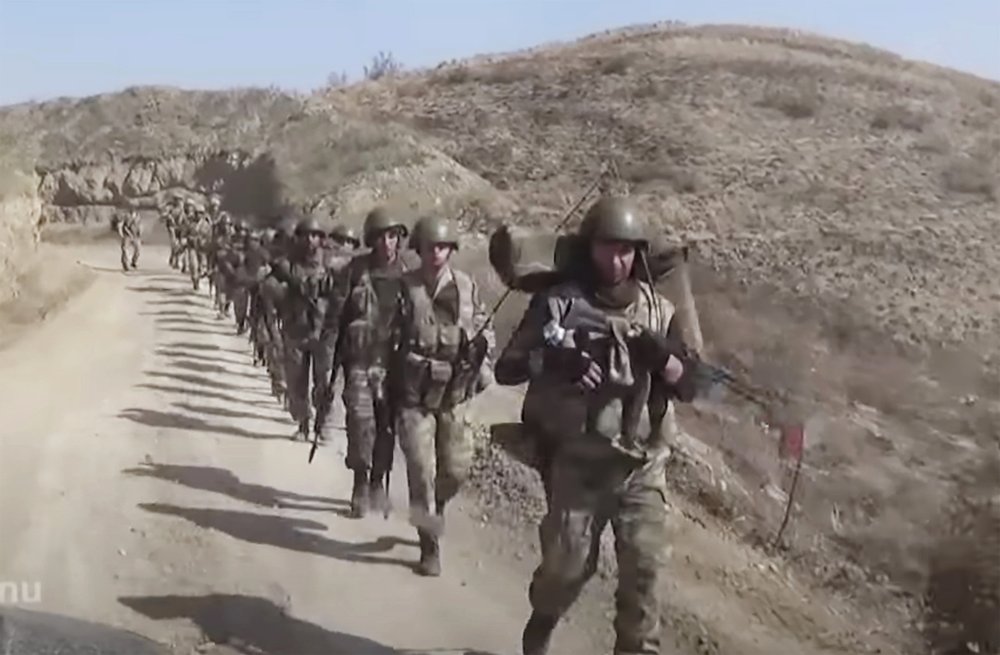It’s likely that most Americans didn’t know there was such a place as “Nagorno-Karabakh,” and yet, this tiny region in the Caucasus Mountains might be the flashpoint for a regional conflict that could even see U.S. involvement.
Nagorno-Karabakh, a mountainous province in the Lesser Caucuses, is situated between the Republics of Armenia and Azerbaijan. During the 1920s, the Soviet government placed Nagorno-Karabakh under the administration of the Azerbaijan SSR, despite the fact that it was overwhelmingly populated by ethnic Armenians and continues to be to this day. In 1988, the region’s legislature voted to reunite with Armenia and, seeing this desire frustrated, in 1991, with the collapse of the Soviet Union, they declared their own independent state called the Republic of Artsakh, the Armenian name for the province.
Armenia, acting as the guarantor of Artsakh sovereignty, fought a war with Azerbaijan over the province which ended in a ceasefire in 1994. In addition to retaining Artsakh independence, the Armenians also captured Azeri territory surrounding the enclave, which it occupies militarily to this day. That war left 30 thousand dead and thousands more displaced on both sides of the conflict.
In late September of this year, tensions swelled again as both sides accused the other of initiating skirmishes along the militarized border. Hundreds of military and civilian casualties have been reported, although it is difficult to ascertain the full extent of the loss of life. Towns all along the line of contact have been shelled, including Stepanakert, the de facto capital of the Artsakh Republic. A recent ceasefire brokered by Moscow was broken almost immediately, with both sides accusing the other of aggression.
Hanging in the background of renewed tensions are the two regional powers that have stake in the conflict: Turkey and Russia. Turkey supports the Azeri side, and President Recep Tayyip Erdoğan has repeatedly voiced his support for the Azeri cause in strong, often belligerent terms. “We will stand by our Azeri brothers,” said Erdoğan, “at the risk of defying other great powers.”
Russia, meanwhile, at least nominally supports Armenia, maintaining a base in Gyumri. Nevertheless, President Vladimir Putin has not, at least publicly, pledged to support Armenia beyond what their involvement in the so-called Minsk Group (a group of nations tasked with finding a sustainable solution to Armenian-Azeri relations) allows. As a matter of fact, Russia has explicitly stated that their security guarantees to Armenia do not extend to Nagorno-Karabakh.
So far, the fighting has been inconclusive, with Armenian and Artsakh forces losing ground within Nagorno-Karabakh itself, but reportedly moving to expand the conflict along the whole Line of Contact. Armenian forces have used Soviet-era short and medium range missile systems to attack targets in Azerbaijan which have killed Azeri civilians. While Armenia maintains that such civilian casualties were collateral damage from attempted attacks on military targets, the Azeris argue that they amount to targeted attacks against non-combatants by the Armenians.
Both sides are very aware that, in the 21st century, all wars are wars of information, and both sides have been very careful to curate their own telling of events to garner international aid and harm the reputation of the enemy among the wider community of nations.
How one approaches the conflict will depend their understanding of national sovereignty and consent of the governed. The people of Nagorno-Karabakh clearly want to be part of Armenia, and the fact that they are technically under the jurisdiction of Azerbaijan is a happenstance of history, and may have even been deliberately engineered by the Soviets. Does this fact entitle them to the right to rejoin with their ethnic brothers and sisters in Armenia? Or does international law take precedent? In the latter case, the region clearly belongs to Azerbaijan.
There is also another looming historical contingency of the current conflict, and that is the Armenian genocide of 1914-1923, during which over a million ethnic Armenians were mass murdered and forcibly expelled from regions in and around Turkey by various Turkish administrations. Azeris also partook in that violence in events such as the Shusha Massacre of 1920 within the borders of the disputed region.
During the end of the Soviet era in the late 1980s and early 1990s, both Azeris and Armenians were expelled or killed on both sides of the border in ethnic pogroms, and yet this does not change the fact that Armenia is a nation less than half the size of Azerbaijan and dwarfed by Turkey. Unlike Azerbaijan, which has annual oil revenues of around $9,088 billion, Armenia relies on foreign investments and remittances from the massive Armenian diaspora, nearly four times larger than the population of Armenia itself and growing all the time due to emigration. A joint Turkish-Azeri blockade of the landlocked nation, imposed in response to their support for the Artsakh Republic, has crippled key Armenian industries like the energy sector.
The situation in Nagorno-Karabakh has deteriorated to the point that it might be accurately described as ethnic cleansing. Ethnic cleansing, as defined by a UN Commission of Experts tasked with looking into the violence in the former Yugoslavia, consists in, “a purposeful policy designed by one ethnic or religious group to remove by violent and terror-inspiring means the civilian population of another ethnic or religious group from certain geographic areas.”
According to reports provided by the independent Institute for War and Peace Reporting, residents of the disputed territory report not only shelling of civilian areas, but also attacks on the power grid, courthouses and other government buildings. Attacks on civilian infrastructure, which are generally intended to displace civilian populations, have done their work according to regional officials in Nagorno-Karabakh, who claim that 50% of the population and 90% of the women and children in the province have fled. If one were to be cynical, they might draw the conclusion that Azeri forces are attempting to make sure, no matter what the outcome of the current conflict, that as few ethnic Armenians as possible are living on what they perceive as rightful territory belonging to Azerbaijan.
Such reprehensible motives are, presumably, supported by Azerbaijan’s allies in Ankara who have characterized Nagorno-Karabakh as being occupied by Armenia saying that, before a ceasefire should be brokered, “occupiers need to leave the land they’re occupying first.” There are many examples of occupied nations being liberated in world history, but rarely do those “liberations” come in the form of intentional attacks on civilian infrastructure and a mass displacement of the population.
If the situation in Nagorno-Karabakh gets any worse, however, American involvement will most certainly be requested. While the U.S. is a part of the Minsk Group, most negotiations so far have been brokered through Moscow. That may not be possible if, for example, Turkey takes a more active role in the conflict. As a North Atlantic Treaty Organization (NATO) ally, the U.S. is under defense obligations to Turkey. While such reckless actions may prompt an ejection of Turkey from the alliance, that may serve to further destabilize the region, as Turkey would then have wider latitude to pursue expansion, even against other NATO states like Greece.
Jettisoned from the alliance, the U.S. could also no longer count on Turkey as an ally against Russian influence in the region. Furthermore, the U.S. has two military facilities in Turkey, including Incirlik Air Base which houses tactical nuclear weapons.
And if the conflict were to take a more dire turn than it already has and reports of direct genocide were to surface, the international community, and many Americans at home, might see it as the government’s obligation to intervene in the conflict. If that were to happen, this tiny mountain province that almost no one in the U.S. had heard of before this month could cause another protracted and costly American expedition abroad.
Photo Credit / Associated Press


